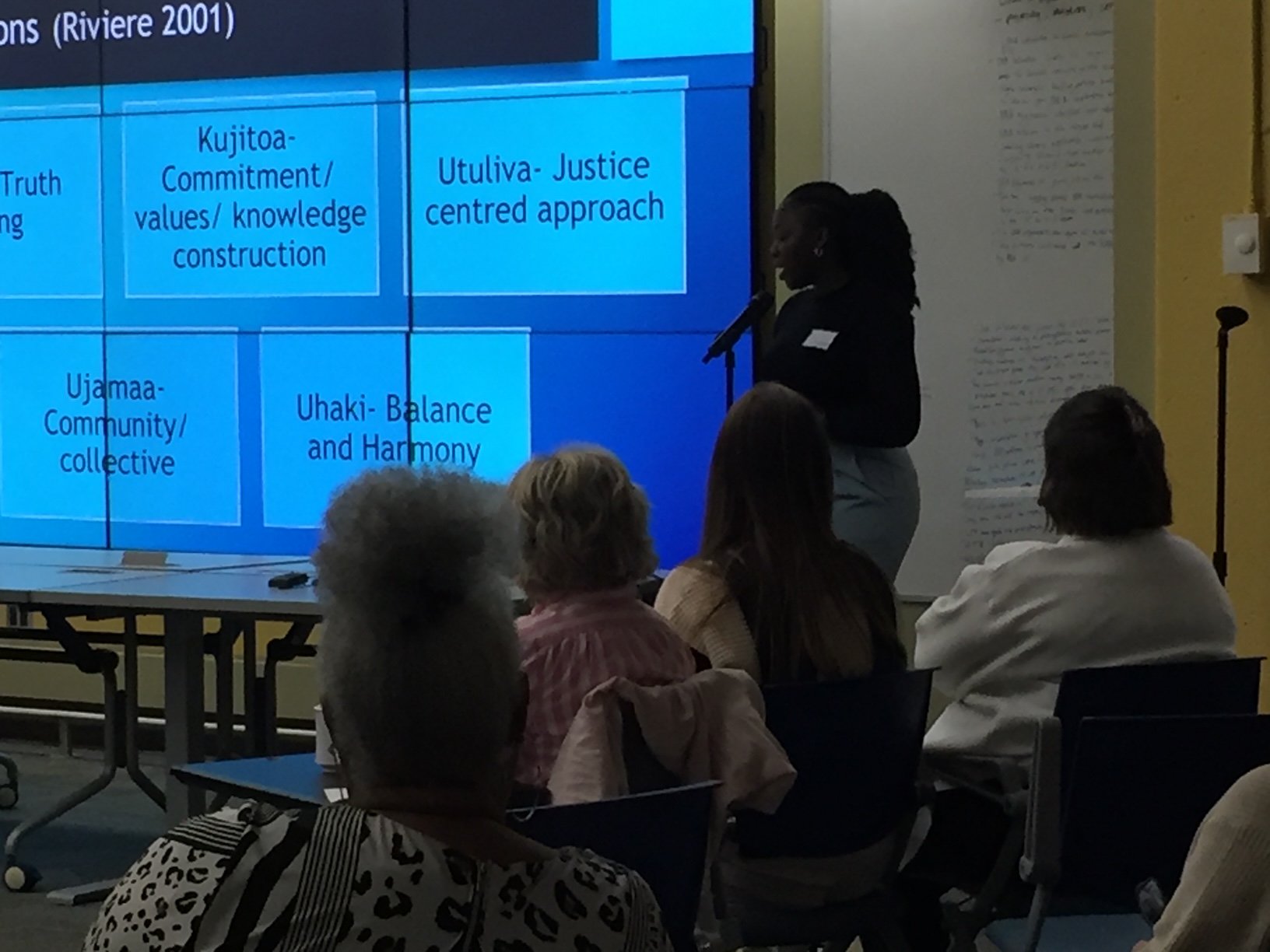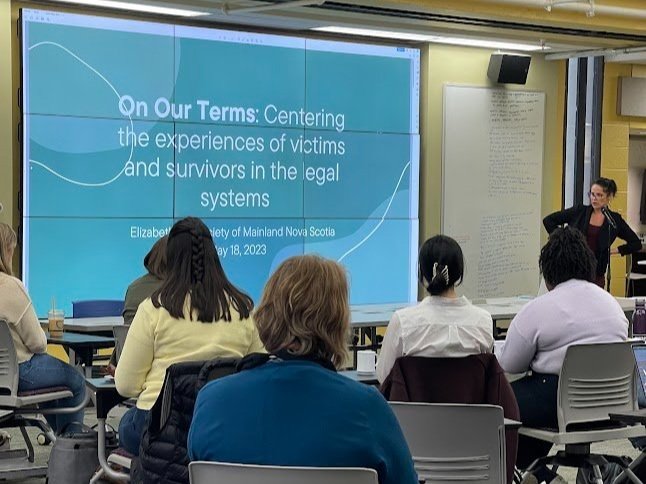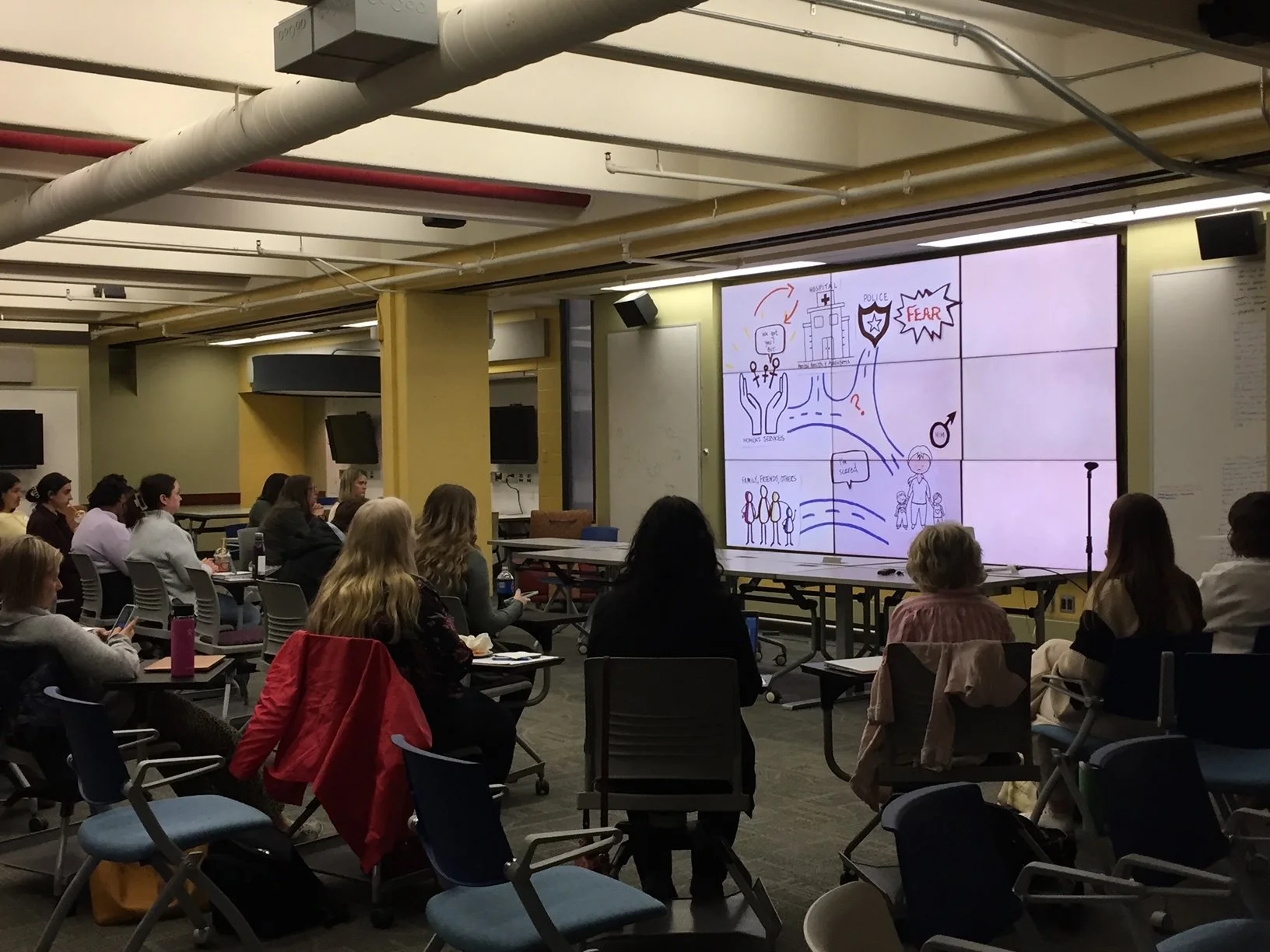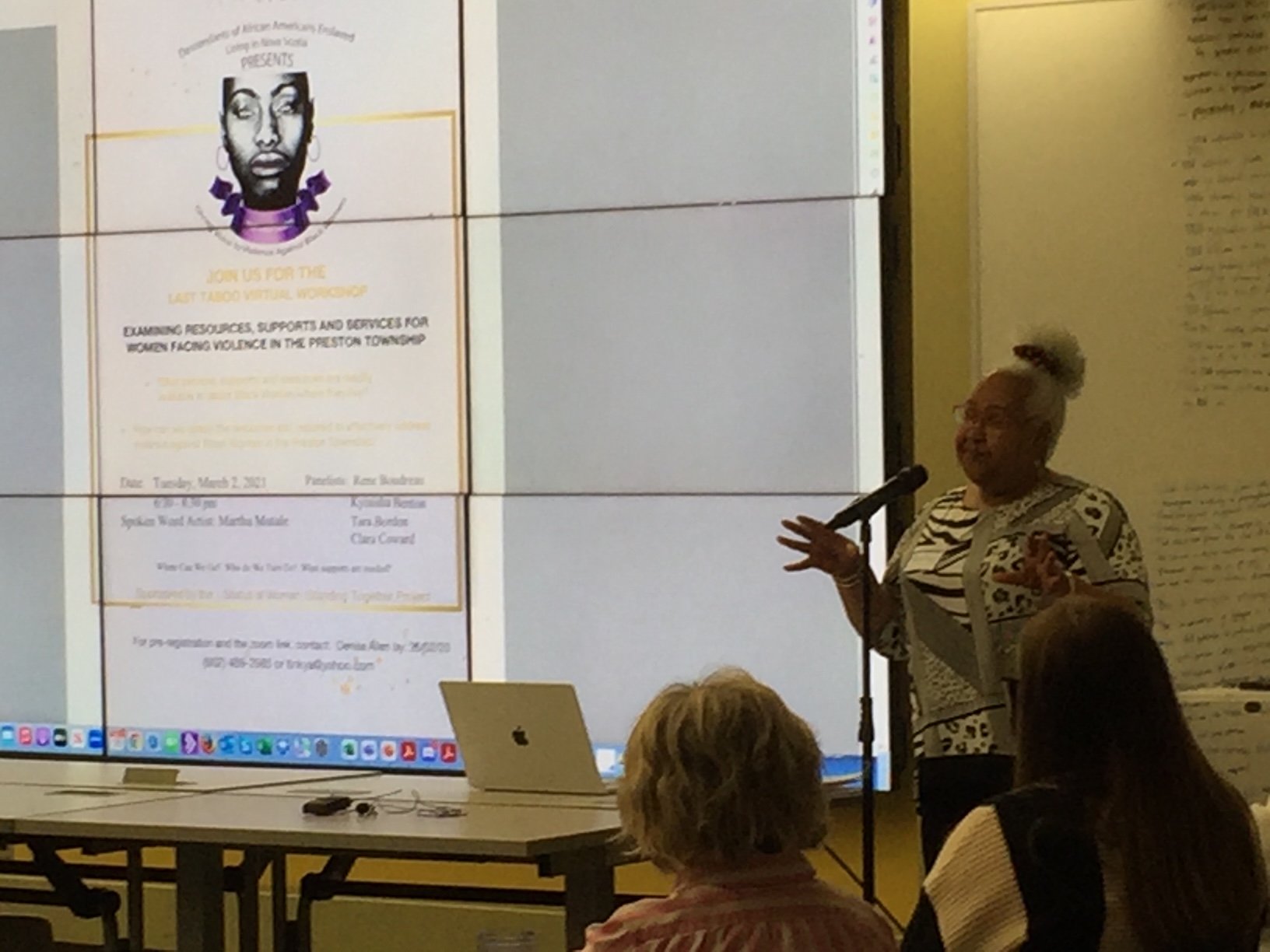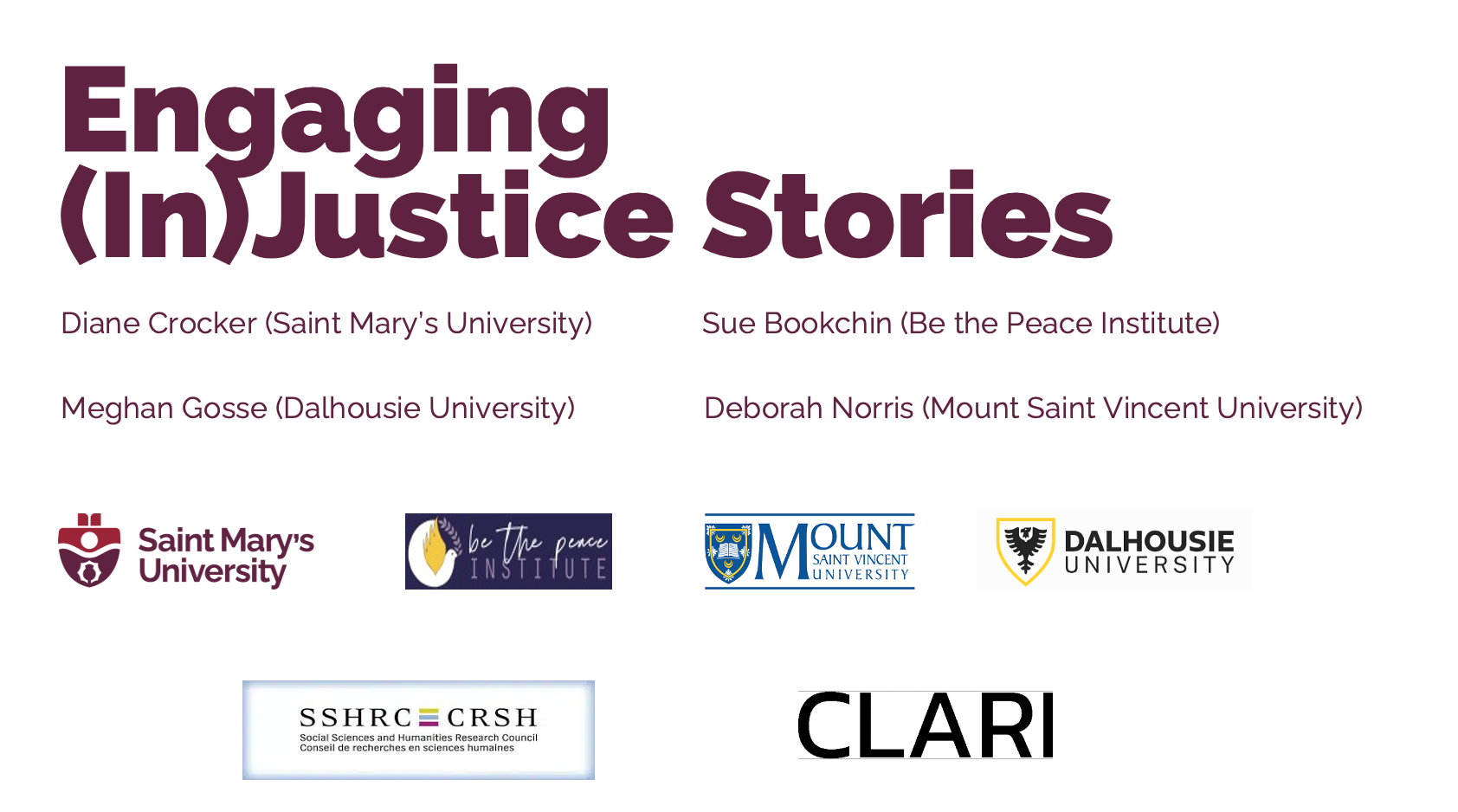In Their Own Words:
May 18th, 2023
Collaborative Research on Gender-Based Violence by Engaging Those with Lived Expertise
Funding from: Justice Canada PCVI for Victims and Survivours of Crime Week
With funding from Justice Canada PCVI for Victims and Survivours of Crime Week (May 14th -20th, 2023), Be the Peace Institute and partners convened an event for sharing of survivor-centred research on gender-based violence (GBV) in Nova Scotia.
The theme for Victims and Survivors of Crime Week 2023 was “The Power of Collaboration.” For us, collaboration includes the voices of people with lived expertise in academic/community partnered research to bring their direct voices to the fore. Raising awareness of the issues facing victims and survivors of crime ‘in their own words’ is a critical dimension of creating better responses to serve and protect them from further harm as they search for accountability, healing and justice after GBV.
Collaboration is also about connecting dots:
What are the commonalities among first-voice research findings?
What themes emerge repeatedly?
What issues and barriers constitute patterns that require systemic responses?
What collective action and advocacy is needed to shift the patterns?
Where are the current leverage points for change?
This inclusive event welcomed all who have a stake in improving the quality, accountability and cultural responsiveness of services, responses and supports to survivors, families and communities, with positive impact for those served.
Background
When we started the first Be the Peace project in 2012, there was hardly any direct research on GBV happening in Nova Scotia. A decade later, there is a proliferation of research in this area that involves both academic and community-based partners who understand the value of tapping into the direct knowledge of people who have experienced GBV, and also attempted to seek redress through various legal channels. These experiences have not been universally positive, and in-fact, many survivors have articulated the further pain and trauma they suffered in the process of engaging with these systems. These are consistent findings among the various projects, and as a body of evidence call us to rethink and revamp responses to GBV in all its forms in order to more humanely serve those who have been most harmed, “in their own words.”
The Invitation
We gathered a project team consisting of Be the Peace Institute staff with research collaborators, Dr. Nancy Ross from Dalhousie University School of Social Work, Dr. Diane Crocker from St. Mary’s University, Department of Criminology, and Meghan Gosse, PhD candidate at Dalhousie University and former research assistant.
A broad invitation was dispersed through our collective networks, as well as on social media to diverse communities for this in-person, full-day event hosted at Dalhousie University Killam Library site.
A small group of survivors with diverse backgrounds were invited to attend and share their stories with the assembled in their own words. Of these, two were available to attend.
Project teams from 12 different research projects involving first-voice participants were invited to present their research findings and then engage in conversations about the research and its impact. Eight project teams were available to present in-person, two others crafted a video to be shown at the event. A list and description of these and other GBV projects in NS was compiled and sent to all registrants so they could seek more detailed information about the projects at any time.
A total of 60 people registered for the event from community-based organizations and locations in legal, educational and health systems, Status of Women office, as well as students and survivors. Approximately 45 people attended.
The Event
The event began with a circle, land and peoples acknowledgement, introductions, parameters for creating a ‘safe enough’ space to engage with emotionally charged material, introducing a counselour/support person available to anyone throughout the day, and ways to take care of oneself if discussion activated difficult feelings. The purpose of the day was framed with acknowledgement of funding from Justice Canada PCVI and the themes and for 2023 Victims and Survivors of Crime Week. We were charged to consider what it would mean to decolonize research by re-centring the knowledge and wisdom that is deemed credible, worthy and valuable as residing in those with lived expertise; and further disseminating the findings to those who can use it to transform practices, policies, laws and the prevailing social narrative about GBV.
To centre the assembled in the experiences of those harmed, to counteract the widespread silencing and gaslighting that is so prevalent in situations of GBV, and to honour the voices of those who come forward and those who cannot, the project team members spoke 45 direct quotes from participants in the research projects into the room as “voices from the field.” This was a very moving experience for those present, reminding us that the narratives of the survivors hold immeasurable weight in dismantling the oppressive male power structures that enable such violence to persist.
The Research
The day proceeded with brief presentations from each of 8 research teams on the following projects, with a focus on the first-voice findings:
VOICES OF (IN)JUSTICE – Dr. Diane Crocker (SMU), Meghan Gosse (Dal), Sue Bookchin (BTPI), Dr. Deborah Norris (MSVU)
CULTURALLY RESPONSIVE GBV CARE FOR AFRICAN NOVA SCOTIANS - Divine Gbeve Onyenike, Dr. Nancy Ross (Dal), Dr. Wanda Thomas Bernard (Dal), Sue Bookchin (BTPI), et al
MY VOICE MATTERS - Stacey Godsoe (BTPI) and YWCA Halifax
ON OUR OWN TERMS – Emma Halpern (E. Fry)
WEIGHING JUSTICE IN NS – Dr. Nancy Ross, (Dal), Sue Bookchin (BTPI), et al
THE LAST TABOO- Shelley Fashan (Descendants of African American Slaves Living in NS), et al
INTERPROVINCIAL VAW PROJECT Bridget Steele and Dr. Alexa Yakubovich (Dal)
CANADIAN DOMESTIC HOMICIDE PREVENTION INITIATIVE– Dr. Diane Crocker (SMU), Dr. Mary Aspinall (STU)
Two videos were also presented from:
#TALK JUSTICE- (Access to Justice and Law Reform Institute)
PATHWAYS TO JUSTICE trailer for larger documentary (BTPI)
Note that Be the Peace Institute was a community partner in 5 of the projects above.
Divine Gbeve Onyenike , Dalhousie University, presenting on the “Culturally Responsive GBV Care for African Nova Scotians” project
Dr. Diane Crocker, St Mary’s University, presenting on the “Canadian Domestic Homicide Prevention Initiative” project.
Emma Halpern, Elizabeth Fry Society, presenting on the “On Our Own Terms” project
Participants watch the trailer for the “Pathways to Justice” documentary - a project of Be the Peace Institute & the NS Association of Black Social Workers.
Survivor Stories
Two women who had been subjected to GBV were able to join us in order to share, in their own voices, about their journeys in the aftermath, and what it has meant for them to speak openly about their experiences and their advocacy. (Two others invited, were not able to make it).
L.L. and C.L. have both spoken publicly and openly about sexual assault and sexual harassment situations that have altered the course of their lives. There was talk of feeling dehumanized; that “we don’t care about women;” of remembering the first time they felt validated (by a women’s services person); not realizing how traumatizing the legal system is; being asked to sign a non-disclosure agreement and threatened with legal action when refusing to be silenced; the horrible processes of legal system and human rights complaints; and the huge personal cost, not only of the actual harm, but the consequences of speaking out—the trauma, judgements, mental health struggles and loss of jobs. Also cited was the abuse of power, the care-less attitude of those in positions of power and privilege, and how there is no justice and no healing, even after years of effort.
They have been relentless advocates for legislation to prevent use of NDA’s in sexual assault and harassment situations; peer-led support and navigation assistance; changes to the police complaints process and accountability; duty of care owed by police to victims; survivor choice about the silencing impact of publication bans; a human-centred approach in responses to GBV crimes; laws to govern sexual harassment besides Human Rights complaints; and the power of bringing survivors’ expertise to all tables.
Many people said hearing these direct voices was the most significant part of the day. We honour and support their courage in the face of insurmountable obstacles, and join them in the struggle for justice, accountability and healing.
Synthesis
It was the intention to have two rounds of “Open Space” conversations to digest and synthesize what was heard, pose deeper questions, and ask more about the research, but there was time for only one round of small group discussion among participants for this. We asked:
What stood out for you from the findings?
What themes arose repeatedly?
What is significant about these?
What ideas for action are emerging?
What emerged in the share-back was:
First voice expertise-- The unmatched importance of valuing voice, agency, choice and lived expertise; the importance of research that engages first voice experts in a meaningful and participatory way.
Cultural lens—having Afrocentric research represented; the need for cultural competence and an intersectional lens within the whole system; concepts of decolonizing research; and also inclusive of men.
Human-centred vs. system centred approach-- relationality as a critical dimension that needs to be valued and supported in organizations and systems; how to support those working in the systems to do the work better, to have compassionate responses?
People need consistent support throughout the complicated process.
Criminal justice system—is stagnant; mistrust of the system and processes; need for unified courts; it is “shocking how the criminal justice system deters people from reporting;” similar to ‘defunding the police’, can we defund the justice system because it cannot meet the needs of GBV survivors, and create more effective alternative pathways for justice? Survivors need better access to legal information.
Networking-- importance of collaboration and making connections together; having a multidisciplinary approach.
Power and Politics—the need to examine not only system barriers but also power dynamics; how to get decision-makers and people in power in the room; the need for concerted political action.
Closing circle
There were very heartfelt reflections on the day in the closing circle. Many people appreciated coming together in-person again (after pandemic restrictions), the “care” created together and “the magic” that happens. They talked about how “disheartening” it is to still be talking about this after so many years, that “in some ways we haven’t come that far.” For others it was “eye-opening,” “not realizing the justice system is as broken as it is,” and the “frustration” of what’s not working. Many spoke of it being very informative, accessing new resources in a short time, a lot of information presented in a positive way, and with so much different research, not feeling alone. Students who attended were appreciative as they don’t often get to steep in one area. Emotionally, people spoke of how “we don’t value women,” and “when we don’t listen to women, people lose their lives.” “It’s so hard to get through to people.”
A key take away is that these types of event often feel like “speaking in an echo chamber” or “preaching to the choir.” Its “empowering, cathartic and supportive,” so we don’t feel alone, but the work is still done in silos, duplicating work, and we “need formal ways to collaborate, support each other’s work,” get system decision-makers in the room and “change attitudes and consciousness.”
“Listening to the survivors and advocates made the info learned feel real. Their stories really inspired a sense of a need for change.”
Stacey Godsoe, Be the Peace Institute, presenting on the “My Voice Matters” project.
Shelley Fashan, Descendants of African American Slaves Living in NS, presenting on “The Last Taboo” project.
Meghan Gosse, Dalhousie University, presenting on the “Voices of (In)Justice” project.
Dr Nancy Ross, Dalhousie University, presenting on the “Weighing Justice in NS” project.
Videos & Power Points
Click on each image to see more.
“TALK JUSTICE” Ilana Luther and Emily Tallon, Access to Justice & Law Reform Institute of NS.
“PATHWAYS TO JUSTICE” trailer Sue Bookchin, Stacey Godsoe (BTPI) and Courtney Brown, Veronica Marsman (Association of Black Social Workers of NS).


